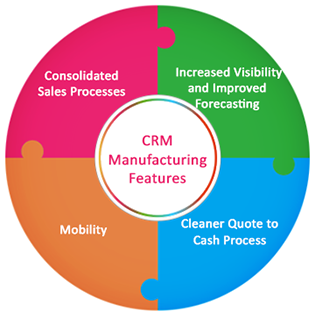
CRM Manufacturing Features
1. Consolidated Sales Processes
One specific challenge that manufacturing firms face is supporting two modes of selling: a direct sales team and a distribution channel. Not only are you focused on appealing to your distributors so they push your product, you’re managing your direct sales team and their relationships with your clients. So what happens when your direct sales team goes head-to-head with your distributor on the same project? Are you even aware of the overlap before it’s too late? A well-implemented CRM Manufacturing system is flexible enough to support the two different modes of selling and get your teams the information they need to ensure you aren’t engaging yourself in a bidding war.
Sign up to get FREE CRM Trial
2. Increased Visibility and Improved Forecasting
In our experience, we’ve found that a majority of sellers don’t have access to their ERP systems. This is a problem! If you don’t have a CRM Manufacturing system and you’re storing valuable client and product information that your sales force needs, you have a problem. Because of this lack of access and information, any hope for accurate forecasting goes out the window. When integrated, ERP and CRM systems can give your team real-time visibility into the business data so they can properly sell and have compelling conversations with customers.
3. Cleaner Quote to Cash Process
This is a conversation we have with almost every one of our manufacturing clients. The concept of having to create accurate quotes off of complicated product configurations is an extremely difficult task. But with increased visibility comes an improved quote to cash process (hallelujah!) We know that the product configurations that you create can be very complex because you build to order. Every choice impacts the next and without a deep understanding of the product configuration at the beginning of the project you’re setting yourself up to fail. Unfortunately, we’ve found that the beginning of the sales process hasn’t paid enough attention to product configurations and how this impacts the entirety of the project’s lifecycle. When CRM and ERP systems are integrated, your sales team can access the information they need at the beginning to accurately quote and deliver.
4. Mobility
Now that you’ve addressed the two modes of selling, determined who is responsible for the sale, and integrated your CRM and ERP systems properly, your team is ready to hit the ground running. Or are they? Your field team is on the road having dynamic conversations with customers and they must be able to update content at the point of interaction, not at the end of the day. You have to have a mobility strategy that allows you to update pipeline and quote information on the fly.
To find out more about CRM Manufacturing, click here![]() to conduct a free call.
to conduct a free call.



